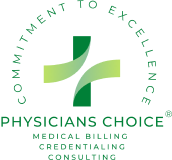Physicians and Virtual Credit Card Fees

For years, physicians have incurred reduced payments from commercial health plans from virtual credit card (VCC) payment products and from third-party electronic payment vendors charging fees for standardized EFT transactions. The fees charged to providers for these payments add to the many financial burdens physicians already face.
Background on EFT Fees
HIPAA establishes a standard electronic transaction for EFT payments to providers to help the industry move away from costly and burdensome paper checks. These EFT payments are akin to an employer direct depositing an employee’s paycheck into their bank account. As of 2022, 75% of claims payments were made using the standard EFT transaction.
45 CFR 162.925 allows health plans to charge a nominal transaction fee to cover certain costs. This fee is about $0.34 per transaction. The regulation does not permit health plans to charge any fees beyond this transaction fee for EFT payments conducted using the HIPAA transaction standard.
Some companies exploit a loophole in this regulation to charge providers a fee beyond the nominal transaction fee for EFT transactions. Specifically, 45 CFR 162.925(a)(5) says the prohibition on fees applies to EFT transactions “directly” between a health plan and provider. Some health plans are contracting with third-party payment vendors to facilitate the EFT vendors on their behalf. These payment vendors claim they are exempt from the fee limits because the transaction is not occurring “directly” between the health plan and the provider.
The key architect of this loophole is a former CMS official who wrote the 45 CFR 162.925 regulation who now is on the government relations staff for one of the largest EFT payment vendors.
Background on Virtual Credit Cards
Some commercial health plans attempt to reimburse physicians for covered services using a VCC. A VCC is not a physical credit card. A VCC is an electronic number that health plans provide to physicians to receive payment similar to a credit card transaction. VCCs apply a payment fee just like any other credit card. Health plans cannot force physicians to accept VCC payment. They must allow physicians to opt out of VCC payments and receive a standard EFT transaction instead. However, the opt-out process places an extreme administrative burden on practices. What’s more, the alterative EFT payment might carry a similar fee if the health plan uses a third-party payment vendor for their EFT transactions. While CMS has authority to regulate HIPAA transaction standard violations, CMS does not have any authority to regulate VCCs.
Solutions
Providers are tired of paying a fee to get paid! How would you feel if your employer charged you a 3.2% fee to direct deposit your paycheck into your back account? Electronic payment fees further reduce payments beyond the cuts physicians already face.
In 2022, CMS issued new guidance to try to close the EFT fee loophole by clarifying that providers can file HIPAA complaints to CMS against health plans if their business associates (e.g., third-party payment vendors) violate the transaction standard. However, the complaint process is difficult to navigate and slow to produce a solution. Further, it puts the enforcement onus on physicians.
HBMA is championing two efficient legislative solutions to prohibit electronic payment fees. CMS does not have the authority to address this issue beyond the guidance it recently issued. Legislation passed by Congress is the only way to prohibit these fees outright. HBMA recommends Congress adopt the following legislative solutions:
Solution 1: Close the EFT Fee Loophole
Update 45 CFR 162.925(a)(5) language to specify that fees are prohibited for transaction that occur directly between a health plan and a provider and EFT transactions facilitated on behalf of a health plan by a covered entity or other third party.
Solution 2: Prohibit Automatic VCC Payments Without a Provider’s Advanced Consent
CMS does not have any authority to regulate VCCs. Congress should prohibit all commercial health plans from paying providers using a VCC unless the provider consents to the payment in advance. This changes VCCs from an opt-out to an opt-in payment option. Physicians should also be allowed to opt out of VCC payments for all transactions instead of opting out of each transaction individually.
While no cost score is available for these proposals, we believe both solutions will save money by incentivizing the transition to cost-effective electronic transactions for EFT payments – which has a total savings opportunity of $1.4 billion.
Conclusion
CMS has made attempts in the past but each of those have been thwarted by lobbying from the payment vendor industry. CMS also does not have enough statutory authority to fully act on this issue even if there was no opposition to such action. Reporting by ProPublica highlights examples of the payment vendor industry lobbying against CMS’ efforts and shows a far-too-cozy relationship between the payment vendors and CMS regulators. In one egregious example, CMS staff responsible for regulating the industry asked a payment vendor’s lobbyist how to respond to a physician’s complaint about that vendor.
Physicians have lost patience for CMS to take a stand against electronic payment vendors. Recent reporting has highlighted close relationships between CMS and the vendors who are responsible for these fees. Electronic payment fees from EFT vendors and VCCs add to the immense financial and administrative burdens that physician practices face. This is money that should be spent on patient care.
